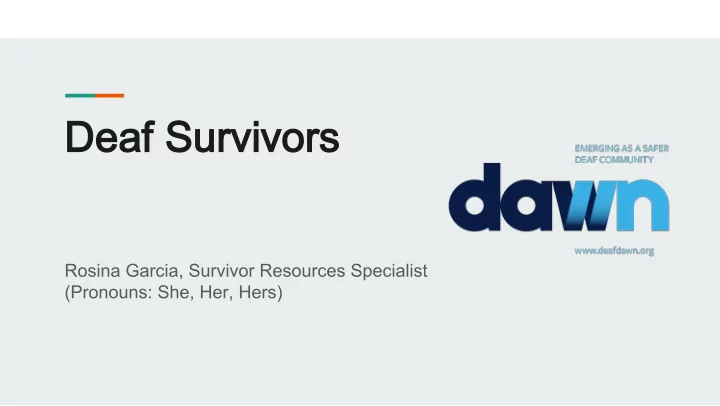

Deaf Survivors Deaf Survivors Rosina Garcia, Survivor Resources Specialist (Pronouns: She, Her, Hers)
Deaf Deaf
Disabilities Disabilities ● Blindness, Low Vision, Leprosoy Cured persons, Locomotor Disability, Dwarfism, Intellectual Disability, Mental Illness, Cerebral Palsy, and 13 other types of disabilities
Facts Facts 48 million Americans have a significant hearing loss. • Over 90% of deaf children are born to hearing parents. • 14% of those ages 45-64 have some type of hearing loss. • 15% of children between the ages of 6-19 have a measurable hearing • loss in at least one ear. Hearing loss occurs in 5 out of every 1,000 newborns. • Only 16% of physicians routinely screen for hearing loss. • Approximately 3 million children in the U.S. have a hearing loss; 1.3 • million of them are under the age of three Only 10 to 15 percent of patients with sudden deafness know what • caused their loss. (http://www.deafandhoh.com/hearing_loss_statistics.html/http://chchearing.org/facts- about-hearing-loss/)
https://projects.iq.harvard.edu/asl/deaf-history-timeline Deaf history Deaf history
Deaf Culture Deaf Culture Sharing the same language (American Sign Language) Deaf Institutes where American Sign Language, Deaf culture and Deaf sports are shared. • Deaf Clubs: once popular in the past, now on decline because of rise of technology • Deaf sports including Deaf Olympics (Curtis Pride, Kenny Walker, and Dummy Hoy) • The visual arts: De’VIA (Deaf View/Image Art) • ASL Literature: ASL storytelling, ASL poetry, ASL jokes, ASL cartoons: Washington D.C. - ASL LIVE, ASL SLAM
Identities/Labels Identities/Labels Hearing Impaired Deaf DeafBlind DeafDisabled Hard of Hearing Late-deafened
Systematic Ideology Systematic Ideology
Hearing Privilege Hearing Privilege Phonocentrism Phonocentrism
STATISTICS STATISTICS ● Language Barriers – Language deprivation ● Systemic Barriers – Accessibility ● Multiple level of oppressions – Audist society
Language Deprivation Language Deprivation
DAWN DAWN (formerly known as Deaf Abused Women’s Network) (formerly known as Deaf Abused Women’s Network) Only organization in the DC Metro area and Maryland serving Deaf, • DeafBlind, DeafDisabled, and Hard of Hearing survivors Provide Deaf Survivor-Centric, Trauma-informed Services • Advocates are fluent in American Sign Language and have a strong • knowledge and deep understanding of Deaf culture and Domestic Violence (DV)/Sexual Violence (SV) Develops strong, collaborative relationships with hearing & deaf • agencies PROGRAMS: • ⮚ Survivor Support Services ⮚ Community Outreach and Education ⮚ Deaf Men as Allies Program (on hold)
HEARING STATUS PRIVILEGES HEARING STATUS PRIVILEGES DEAF: HEARING: • Threatening eye contact, Manipulate police and legal ● body language, gestures system • Deaf family status Higher socioeconomic status ● • Deaf community reputation Acts as an interpreter • Spreads false rumors ● Better reading, writing and • Higher socioeconomic ● status speaking skills • Better reading, writing and, Not allow children to learn ● signing skills ASL
DEAF DEAF-BASED TACTICS BASED TACTICS • Overuses floor stomping/pounding on table or door • Signs very close to survivor’s face when angry • Criticizes survivor’s ASL skills or communication style • Makes survivor afraid with gestures, facial expressions, or exaggerated signs • Denies or minimize abuse by saying it is Deaf culture to justify the behavior • Will not allow survivor to mingle with friends and peers. • Leaving the survivor out of social situations with hearing people • Controls survivor’s daily tasks • Wrongly interpreting to manipulate the situation if the police are called • Not allowing children to use sign language to talk with the survivor
INSTITUTIONAL / SYSTEMIC BARRIERS INSTITUTIONAL / SYSTEMIC BARRIERS Economic Economic - Housing, Health care access, SSI / SSDI dependency, employment, education, food, transportation, legal services Access to services Access to services - Interpreting services – different kinds Immigration Immigration – ICE deportation Physical barriers Physical barriers
EXPENDABILITY EXPENDABILITY Smaller culturally marginalized organization offers unique and empowering personal positive experience for survivors: • Survivors of color (especially towards darker -skinned people) • Non-Christians groups (especially those facing Islamophobia) • Immigrations • HIV/AIDs • Disability • International • Trans/Genderfluid/Gender Non -Conforming LGB
MULTIPLE OPPRESSIONS MULTIPLE OPPRESSIONS The cost of sign language interpreters, disability accommodations, communication facilitators hurts the “organization” and becomes a confirmation of “deserved” dehumanization for Deaf, DeafBlind, DeafDisabled, Hard of Hearing services recipients from various marginalized communities which results in multiple oppressions including phonocentrism and audism.
WHAT CAN WE DO? WHAT CAN WE DO? Remember the fact that language deprivation is real and traumatic. Be open and welcoming by allowing them to express their mandatory communication mode. Be available to offer multiple means to communicate: ⮚ Voice interpreting ⮚ Deaf interpreting ⮚ Tactile interpreting ⮚ Protactile interpreting ⮚ Speech reading interpreting ⮚ Cued speech interpreting
WHAT NOT TO DO WHAT NOT TO DO • Do not offer writing method because it is convenient for service providers. Only do it when they ask for it. • Do not automatically refer them to a Deaf agency without asking or without establishing relationship so they do not feel that you are pushing them out of the door. • If client prefers to stay with your agency, please do seek out collaboration and consultation with Deaf service providers or ask for training from Deaf service providers
THANK YOU! THANK YOU! Information: www.deafdawn.org General inquiries: info@deafdawn.org Hotline, Mon-Fri, 9am-5pm: hotline@deafdawn.org Phone: 202-559-5366 Rosina Garcia: rosina@deafdawn.org
Recommend
More recommend